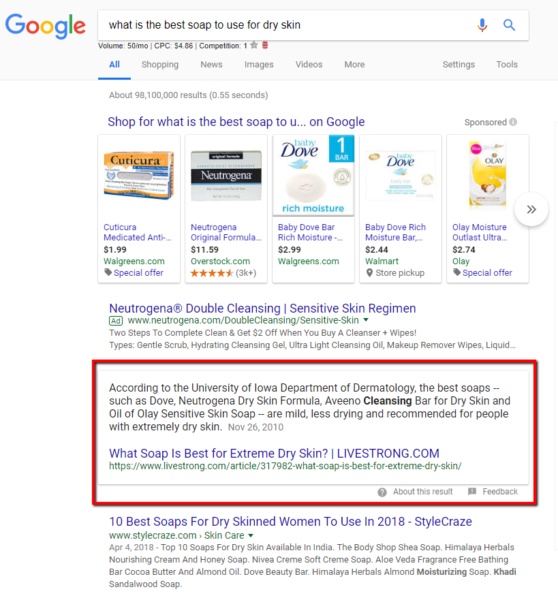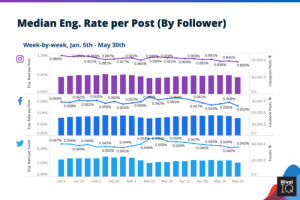— July 5, 2018
As long as I’ve been doing SEO, I’ve tried to push for the early adoption of new products, platforms, and technology whenever possible. The 22 Immutable Laws of Marketing (not an Amazon affiliate link, I swear!) has been a book I’ve leaned on since studying marketing in college.
 The very first law states, “being first in the market is better than having a better product.”
The very first law states, “being first in the market is better than having a better product.”
To me, this concept doesn’t only speak for product marketing. Google is processing tens of thousands of search queries each second. This makes any peripheral that plugs into its search system an incredible marketing and branding platform. The more search results reference a company, the more that company becomes recognized to searchers. So why shouldn’t SEOs be helping companies be first to take advantage of a new technology?
After all, “being first” is our thing.
Granted, some of the new features, technology, and platforms I’ve pushed to clients throughout the years didn’t pan out. For every AMP there’s an Authorship. For every Freebase, there’s a Google+ (sick burn!). It’s not unusual for a modern SEO to suggest using Progressive Web Apps, VR and AR applications (i.e. Amazon Sumerian). If a technology has the potential to improve a searcher’s experience, build loyalty to the brand, and enhance conversions, it falls into the purview of SEO. After all, rankings in results pages aren’t all we should be thinking about these days. We should be thinking about reaching the right searcher, understanding their intent, and giving them the experience they want and need (sometimes these are two separate things). We should be thinking about helping searchers, businesses, and Google at the same time. A win-win-win.
To me, everything above has been the natural evolution of SEO to date.
What is the SEO’s new challenge?
Voice Search is not new, but the role of voice search in everyday computing is growing at an incredible pace. “Voice-first” is showing up in more technology, from stereos to electric outlets. It is most popularized by titans like Facebook and Amazon.
Not to be left behind, Voice Search is Google’s latest shiny object. Compared to Google’s pushing AMP in 2017, this year has shown a real obsession with Voice Search. Google I/O (in May 2018) introduced projects around AI and “continued conversations”. We learned that Google is still pushing for smart displays. These will provide more opportunities for users to ask algorithms for things.
New technologies bring opinions and guesses from all areas of the marketing world. Not to mention, a fair amount of misinformation. You might have heard ComScore’s prediction that half of all searches will be voice searches by 2020. You might have also heard disagreeing naysayers, basing their opinion on the few “ok Google”-stemmed keywords that make it into keyword reports. This is not a good way to measure voice search activity, as evidenced by John Mueller’s tweet to me:
For normal voice queries, we don’t include the triggering in the logged query. I suspect these are from people who didn’t think the first trigger worked, or who used the button and didn’t realize they could just ask. (both happen to me regularly too :-))
— John ?.o(???)o.? (@JohnMu) June 14, 2018
There you go, straight from the horse’s mouth. (John is not a horse.)
These wild speculations are partly because we aren’t receiving any Voice Search metrics from any of the Voice Search providers (though this may change one day), so we’re in a state of ¯\_(?)_/¯ at the moment.
Want some more juicy stats, speculation and opinions?
- Google says 72% of people who own a voice-activated speaker say that their devices are often used as part of their daily routine.
- 55% of 13-18 year olds use voice search every day.
- Google says voice-activated speaker owners would like brands to give them information about deals, personalized tips, upcoming event information, options to find businesses in the real world, and access to customer support.
- 42% of a surveyed group says voice-activated devices have quickly become “essential” to their lives.
How much of this is representative of real life? Clearly the truth lies somewhere in the fuzzy middle.

The first question a business asks is whether it’s worth the investment to play in the fuzzy middle. As I referenced the Immutable Laws of Marketing above, my answer would be yes. But I recognize it’s one thing to stand on my pedestal and spend a company’s money for them, where the failure isn’t necessarily a financial pain I would feel. I also recognize that most SEO campaigns need to have a business case, and the “fuzzy middle” doesn’t lead to convincing anyone of a real opportunity.
So my argument for the investment? SEO is changing again. There isn’t a company out there who doesn’t know what SEO is, and very few who think it has no value. SEO as a marketing channel has already been sold through. So we are not talking about selling SEO here; instead, we’re talking about investing in the next wave. From my perspective, I see many articles written about Voice Search, and the occasional conference talk, but I don’t know many SEOs or companies who are embracing it as an opportunity.
Now, returning to an earlier statement: SEO is not just about rankings. It’s no longer just about getting people to click the little blue links on Google.com. It’s about helping all of Google’s user base across all their platforms. We’re talking Chrome, your phone’s Google Assistant, your Google Home and Mini devices (also powered by Google Assistant). It’s even bigger than Google – the spirit of SEO lives in app stores, Amazon, Youtube, and elsewhere, but I digress.
Think about that last bolded statement for a minute, and consider this real example. My wife was washing her hands in the kitchen and had a sudden thought. She called out, “Hey Google, what is the best soap to use for dry skin?” This is a thought she may have later gone to Google.com and asked (when her hands weren’t dirty), but the convenience of having a Google Mini in our kitchen inspired her to call out. Google responded by saying, “According to Livestrong.com,” and continued by reading the current rich answer:

That shout-out, I argue, is SEO in 2018. There’s no recorded click. There’s no record of anyone hearing that answer (yet). But Livestrong was promoted in my wife’s mind. And so were the products Google suggested.
Winning the featured answer is a start, and SEOs have been studying the techniques for a couple years now. But what about the queries that are more voice-based than text-based? It’s a new type of keyword research. It doesn’t stop there – the skills need to be tweaked for these voice searches. In this Martech Today article, they called it “voice query design,” as a component of “Voice Interface Optimization.” I’ve heard other terms like “conversational UI” and “conversation design”. Some new terms here, and we’ll see which ultimately stick. Labels aside, the technology shows nothing but signs of sticking.
Who better to help optimize this system than an SEO? This is our bread and butter! As more controls are given to marketers to control the answers Google and Amazon’s Alexa give, the more a brand can control their influence.
If you’ve been optimizing for semantic search, you’ve probably already started voice search optimization.
If you have followed me in the past, I was quick to jump on leveraging Google’s epochal Hummingbird changes. When the dust settled, we SEOs realized what Google was trying to do. Google realized they needed to take reliance away from keywords alone, and add a new skill – comprehension. From search entities and the relationships between concepts, Google certainly got smarter within the semantic search model.
Instead of thinking of queries as choppy, fragmented keywords, I began expecting more natural-language queries typed into the Google search bar. With that in mind, it drastically changed how I optimized copy. I was no longer just trying to optimize for a keyword – I was trying to optimize for a theme, and hit upon the concepts and relationships I assumed Google had in their knowledge graph. Remember, at the same time, Hummingbird also brought us huge improvements in conversational search. More of a reason to consider optimization outside of the choppy approach we were used to.
I was trying to match the way I predicted people would be seeking their information. The intent of the searcher and the inherent value of my content became paramount. So much so, I haven’t done nearly as much keyword research as I used to. Gone are my massive lists of keywords and estimated search volume metrics. These days my lists are much, much smaller.
The voice search optimization mindset
SEOs, we have our work cut out for us. We have much to learn as Google keeps growing the abilities of their voice processors, and we should be currently experimenting with this new technology now. We need to stop watching all the headlines pass by our news feeds (which are the same headlines businesses are seeing), and jump in, grab the bull by the horns, and own this for our clients and bosses. There’s money to be made, but SEOs need to evolve.
Think about the company you represent. What are they experts in? What do they do better than any other? If the answer is “nothing,” let me rephrase: What could your company be experts in for voice searchers before your competitors step up to the plate? (Remember the first Immutable Law of Marketing).
With these strengths in mind, it’s important to think about the direct goal that voice search can answer. I suspect with this new technology, there are some impatient and frustrated users who have had their fill of “Sorry, I can’t help you with that right now, but I’m always learning.” Yes, Google is in the early stages – their new child is still a baby, so it makes sense to feed this technology at its level. Build direct answers that can answer direct and popular queries. Additionally, build content that can answer all the anticipated questions in a series of spoken questions. Traditional keyword research now has to consider such nuances.
Are we providing content in a way that not only clearly answers the needs, but also illustrates the content’s importance to Google; thus, improving Google’s growing comprehension? If I want Google to read my content out loud, or serve up a web page on my phone, I better make my content considerable for Google. To do this, I need direct and helpful content passages over long, redundant, over-optimized text. This makes for an easier read anyway. Frankly, this is taking a page out of the content strategists’ playbook, and the mindset they have about web content and the inevitability of voice search. In the end, SEO done right is a win for everybody.
Digital & Social Articles on Business 2 Community
(37)







